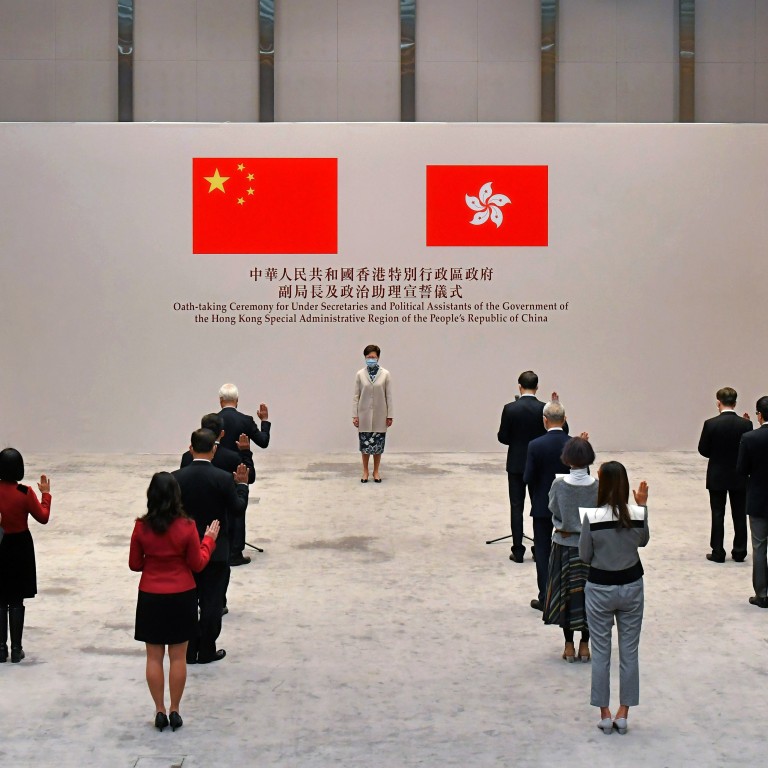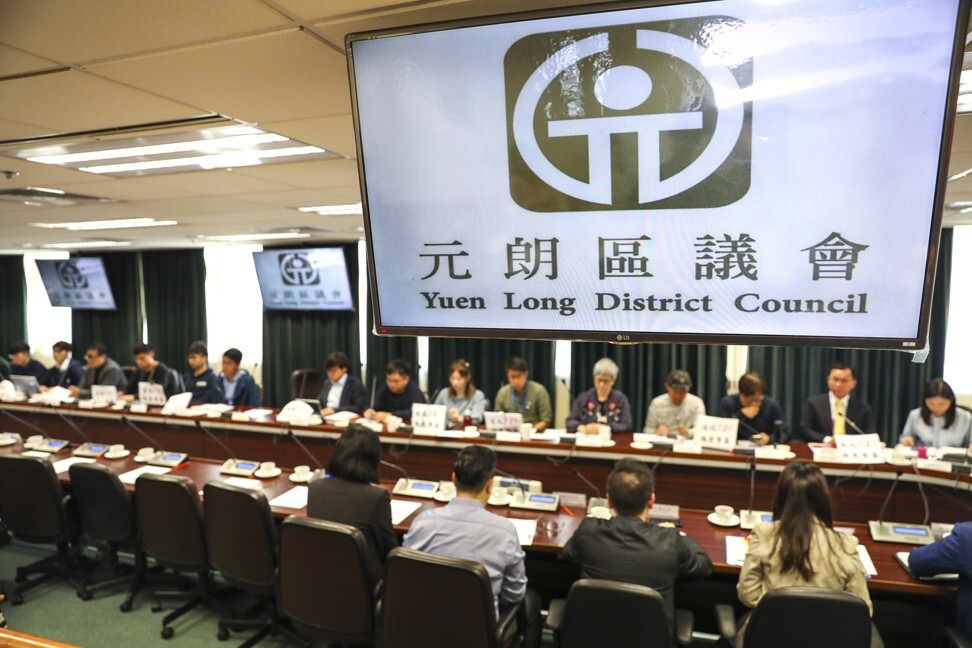
Exclusive | National security law: oath-taking Hong Kong district councillors face disqualification if investigations uncover past misconduct, lack of patriotism
- Authorities to look into politicians’ pasts to ensure they do not pose national security risk and are genuine when pledging allegiance to the city, sources say
- Insider insists breaching the oath will not be a criminal matter, district councillors have right of reply to allegations
But sources said any breach of the oath would carry no criminal consequences, while an “internal mechanism” was planned to allow district councillors to defend themselves against allegations before any potential unseating.
District councillors will have to pledge allegiance to Hong Kong
Sources with direct knowledge of the amendment bill told the Post the changes would empower the city leader to designate commissioners – who could be principal officials from the Home Affairs Bureau – to administer an oath.
The commissioners would hold the power to determine the validity of the oaths, and to rule whether the public office holders had engaged in conduct violating the declaration.
The sources added authorities might look into a politician’s “past acts and remarks” dating prior to their oath in a bid to ascertain whether their pledge of loyalty and commitment to the city was genuine.

It is understood the wording of the district councillors’ oath would be the same as for lawmakers. Those serving in the Legislative Council must swear to uphold the Basic Law, bear allegiance to Hong Kong and serve the city “conscientiously, dutifully, in full accordance with the law, honestly and with integrity”.
While the bill is to make clear those declining to pledge allegiance will be disqualified, it will not catalogue the behaviour amounting to a breach of the oath, with a source saying it would be “impractical to have an exhaustive list of all types of improper acts”.

05:45
Hong Kong’s pro-Beijing camp reeling after crushing defeat in district council elections
The ruling handed down by the National People’s Congress Standing Committee empowered the city government to disqualify lawmakers deemed to have violated their duty of allegiance by engaging in acts that endangered national security, such as supporting Hong Kong independence or seeking foreign intervention in the city’s affairs.
Citing the disqualification of the four opposition lawmakers, a source said: “As the same logic applies, the element of patriotism and loyalty will be taken into consideration when scrutinising the validity of the district councillors’ oath.
‘No intent to intimidate,’ Hong Kong police chief says of mass arrests
Critics feared the amendment bill would pave the way for the mass disqualification of opposition district councillors, with hundreds of them last June unanimously voting in favour of a motion demanding the withdrawal of the national security law, shortly before Beijing imposed it on Hong Kong on June 30.
The source familiar with the bill said it would be “hard to say” whether the authorities would deem such an act insufficiently patriotic, while stressing the “flexibility” of the law had been important in designing the legal framework.
Hong Kong opposition to resign after Beijing rules on disqualification
On the right of reply for those accused of breaking the oath, the source said: “They won’t be dismissed right away. This will be different from the immediate disqualifications of the lawmakers as a result of the top-level resolution.”
As for the full definition of the scope of “public officers”, the Post understands the government still needs time to decide whether to also require employees of public bodies and schools to swear allegiance.
Hong Kong national security law official English version
Last month in a virtual meeting with Hong Kong leader Carrie Lam Cheng Yuet-ngor, President Xi Jinping described “patriots governing Hong Kong” as a fundamental principle in safeguarding the nation’s sovereignty and security.
Also in January, the city’s 180,000 serving civil servants were told they must confirm in writing that they would take the oath or face dismissal in future.
A spokesman for the Constitutional and Mainland Affairs Bureau refused to comment on the details of its proposed amendments, saying a bill would be introduced to Legco after Lunar New Year.
Opposition councillor Super Leung Kwok-ho, convenor of 18 District Councils Liaison, a group formed by pan-democratic politicians, warned the authorities they faced a backlash if they used the vaguely defined term of patriotism as a pretext for removing them from office.
“It would be ridiculous if the regime disqualifies councillors who serve diligently in the community every day simply for his certain past acts or speech on politics,” he said. “It would lead to even poorer governance after all dissent is silenced.”
The Cheung Chau district councillor said he would take the oath so as not to disappoint residents, adding it was his understanding that the bloc had no plans to threaten mass resignations.
High-ranking officials take oath pledging allegiance to Hong Kong and Basic Law
Speaking on condition of anonymity, an opposition councillor from another district said a handful of members in the bloc were considering refusing to take the oath as a “political gesture”. “They are doing it at the risk of losing their seats in protest against the unreasonableness of the requirement,” he said.
Two pro-establishment lawmakers from the Democratic Alliance for the Betterment and Progress of Hong Kong on Tuesday petitioned the government headquarters, suggesting that national security police should also be appointed to investigate and help determine whether a councillor’s oath was valid.
“How to judge whether oaths taken by those anti-China councillors who had supported protest violence are sincere? Police can have a role to make the mechanism more convincing,” said Leung Che-cheung, one of the party’s lawmakers.
Can Hong Kong opposition camp reinvent itself as a loyal Beijing critic?
Meanwhile, the government plans to establish a civil service college this year at North Point Government Offices as a temporary site, according to a submission to the Legislative Council.
The Civil Service Bureau said the facility, first proposed by the chief executive in 2017, aimed to provide training for 10,000 new public sector recruits every year to enhance their understanding of national affairs and the constitutional order.

